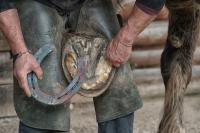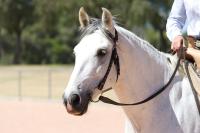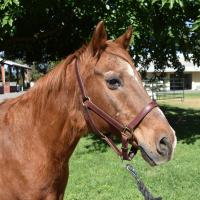10 Things You Might Not Know About Caring for Older Horses
The average life expectancy of horses is around 20 years, but some survive into their 40s. Horses 20 years of age and older increasingly account for a larger percentage of the population, in part due to advances in veterinary care.
Older horses still need routine care. Fortunately, owners are becoming more aware and committed to life-long care and management. Here are 10 things that are important to know about caring for older horses.
- Older and/or retired horses still benefit from grooming. Horses usually enjoy the interaction and grooming is a great way to spend time with your older horse(s). Brushing, currying, etc. is good for horses’ coats, promotes circulation and skin health, and provides opportunities to look over the horse and note any issues. Grooming removes dirt and debris that can harbor bacteria, dead skin cells and stimulates natural oils in the skin.

Regular hoof care is important to keep older horses happy and healthy. - Older horses still require regular hoof care. Degenerative changes, subclinical disease, and nutritional considerations influence hoof problems that are common in older horses such as imbalances, cracks, and reduced horn quality. Joint disease or arthritis can make it difficult for older horses to stand comfortably during farrier visits. Limited or delayed farrier care in older horses can make hoof problems worse, lead to abnormal biomechanics, and exacerbate musculoskeletal disorders. Consult with your veterinarian about ways to make farrier visits more comfortable for your older horse(s).
- Older horses still need to be dewormed. Although more research is needed, age does not appear to significantly influence endoparasite shedding. Interestingly, one study reported that aged horses affected with pituitary pars intermedia dysfunction (PPID) had greater fecal egg counts than young or healthy aged horses. Since PPID is difficult to diagnose in the early stages, fecal egg counts and associated deworming are important to routine care of aged horses.

"Retirement" may look different for every horse. - There is no set age to retire a horse. Horses do not think about retirement in the same way that people do, but most reach a point where they need to slow down and enjoy the easy life. Soundness or other health issues force some horses to retire early, whereas others compete at high levels well into their twenties. A change in attitude - sudden sourness or unwillingness to go forward under saddle - may indicate that a horse is ready to retire from ridden work. Retirement also does not have to be all or nothing. Some horses are retired when they are still performing well and go on to lighter riding or groundwork.
- Sidewinder gait in older horses can have neurologic or musculoskeletal causes. Sidewinder is an unusual gait characterized by disjointed movement of the front and hind limbs in which the hind limbs drift to one side but the front limbs move normally. Severely affected horses may spin or circle in place. Trauma, equine protozoal myeloencephalitis (EPM), intervertebral disc disease, viral diseases, and other neurological causes have been reported in affected horses. Osteoarthritis, pelvic fractures, and ligament ruptures have been implicated as musculoskeletal causes for sidewinder gait.

32-year-old CEH Teaching horse Django receives regular management for PPID. - Horses aged 15 years and older should be monitored for pituitary pars intermedia dysfunction (PPID). Research has shown that 21% of horses 15 years of age and older have PPID, an age-related neurodegenerative disorder, and the prevalence increases by 18% with each year of age over 15 (McGowan et al. 2013). However, this may be an underestimate as clinical signs such as reduced muscling, potbelly, and a long hair coat/failure to shed are considered normal signs of ageing and owners may not seek veterinary advice or pursue a diagnosis. Clinical signs may be subtle and early detection of PPID is difficult. Regular veterinary visits and appropriate blood testing can inform management plans.
- Older horses may benefit from intermittent phenylbutazone (bute) or firocoxib (Equioxx®) if they suffer from arthritis. Non-steroidal anti-inflammatory drugs (NSAIDs) may alleviate pain and inflammation associated with osteoarthritis. They are generally non-toxic if given at appropriate doses but can be toxic, causing issues such as stomach ulcers and kidney damage, if administered long-term and/or at high doses. A veterinarian should prescribe NSAIDs and horses should be monitored for side effects.
- Horses that have dental issues associated with aging may need complete feed or chopped hay. Although horses with dental issues can do well when pasture is available, they may struggle when presented with hay as the only forage option. When fresh grass is not accessible, chopped hay or grass or hay cubes can be fed two to three times daily. Complete and pelleted feeds are also options, but be sure to soak them prior to feeding to prevent choke.
- Diseases related to aging, such as Alzheimer’s and dementia, have not been documented in horses. Although studies have identified a range of age-related changes in the brains of older horses, there is no clinical evidence for dementia in horses. Older horses may experience neurodegenerative changes and cognitive decline, but the underlying biological processes are unique from those associated with Alzheimer’s disease and dementia in humans.
- Older horses may have trouble regulating their body temperature. Just like humans, body composition changes as horses age. Reduced body mass, changes in fat distribution, and variations in how fluids are compartmentalized can make older horses less efficient at regulating their body temperature. Blanketing, stabling, and clipping are important management considerations for older horses.
